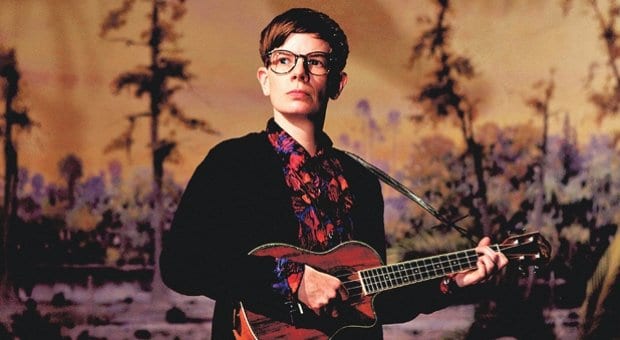Musician and author Rae Spoon might seem diminutive from a distance, but the truth is far different, as long-time friend and collaborator Ivan Coyote knows.
“A lot of people would be crushed inside from some of the things that Rae has survived. Rae is small, and sort of reserved at times, but do not let that mislead you,” Coyote says. “Rae Spoon is probably one of the fiercest and most resilient people I have ever known. And I know some real warriors, I do. But Rae is one of the bravest people I know.”
Spoon (who prefers the gender-neutral pronoun they) has sung their stories, often through minimalist melodies, for more than a dozen years and, in 2012, released a book called First Spring Grass Fire.
But none of Spoon’s work to date reveals their life quite so much as the National Film Board’s new full-length autobiography, My Prairie Home, debuting in BC as part of the Vancouver International Film Festival on Sept 29 at the Rio Theatre.
The film focuses primarily on Spoon’s childhood, tackling everything from fear, to violence, to mental illness. Like most of Spoon’s work, the movie is neither traditional, nor overt. According to My Prairie Home’s director, Chelsea McMullan, that was very much the way they both wanted it.
“I approached the film knowing it was going to be a hybrid — it always was going to be a documentary musical, from the beginning. That was what sold Rae on it. I thought, ‘Okay, you’re going to write this concept album, and I’m going to adapt that into a film about your life.’ They were pretty excited about doing that, and so was I.”
McMullan’s relationship with Spoon has been a slow build; the director earned Spoon’s respect and trust while making three of their music videos, eventually leading them to My Prairie Home.
Spoon’s reluctance to discuss their difficult childhood was initially so great that they couldn’t speak to their director/friend about the tough memories. So instead, the musician did what they do best . . . they wrote.
“When we started making the film,” Spoon says, “I assumed it was going to be more about my adult life. But soon we got into the mires of my childhood, and I was like, ‘Uh oh.’ I wrote 10 stories and gave them to Chelsea. That ended up being parts of my book — the reason I wrote a book is because I was trying to chart it out for Chelsea.”
The film captures Spoon’s endearingly eccentric ways: the start-stop-start stutter of their speech, their shy smarts, the small-town charm mixed with an arched eyebrow and a wickedly sly sense of humour.
Still, My Prairie Home is a subtle film, and at times Spoon’s seemingly understated responses to emotional moments may seem indifferent. They’re not.
Asked if Spoon’s willingness to be vulnerable in the film is surprising, Coyote doesn’t hesitate. “Rae takes pain and hurt and alienation and transforms them into beauty and music and art. They create songs that are more than a simple lament; they are an act of resistance and transformation — triumph, even, sometimes. That takes a special kind of heart.”
Coyote has worked, toured and created with Spoon for more than a dozen years now. They are currently co-writing a book called Gender Failure. Spoon even sang at Coyote’s wedding and at the deathbed of Coyote’s beloved grandmother.
“I would take a bullet for Rae,” Coyote says solemnly. “Truly I would.”
Asked how they feel about getting so personal on My Prairie Home, Spoon states emphatically that it was the candidness of others that inspired them to share so much in this film.
“I really loved [Vancouver author] Amber Dawn’s last book [How Poetry Saved My Life: A Hustler’s Memoir], and I’ve really loved getting to know Ivan over the years. I feel like we aren’t pushing each other, but their work kind of pushes me. I read Amber Dawn’s book and I was like, ‘Okay, my film can come out, it’s fine. This is cool, this is brave, we can do this.’ If I can do that for someone else, that’s pretty cool.”
My Prairie Home, Sun, Sept 29, 9:15pm and Tues, Oct 1, 4pm, Rio Theatre, 1660 E Broadway. viff.org

 Why you can trust Xtra
Why you can trust Xtra


